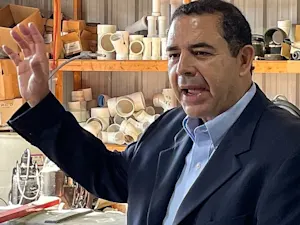
Bernie Sanders' 'Fighting Oligarchy' Tour Takes Off
U.S. Senator Bernie Sanders of Vermont, 2007. Photo courtesy of United States Congress. Public domain.
At 83 years old and with zero interest in running for president again, Bernie Sanders is suddenly the hottest ticket in American politics.
Forget the campaign trail — he's not on it. But good luck telling that to the 34,000 people who packed into Denver's Civic Center Park last Friday to hear him speak. The message? The same one he's been repeating for decades: working-class Americans are being left behind. The twist? This time, the crowds are even bigger — and more fed up — than ever.
So, what exactly is Bernie Sanders doing — and why is it working?
'Fighting Oligarchy' Tour Has the Feel of a Presidential Campaign — But It Isn't One
Sanders has launched a national speaking tour under the banner "Fighting Oligarchy," as reported by NPR. He's joined by Representative Alexandria Ocasio-Cortez, and together they're hitting swing districts and red states alike — including packed stops in Greeley, Las Vegas, and Tempe.
But this isn't a campaign. Sanders has made it clear: he's not running for president again. He told The Associated Press, "You gotta do what you gotta do. The country's in trouble, and I want to play my role."
Despite that, his crowds are breaking records. More than 11,000 people turned out in Greeley, with an overflow audience of another 8,000 watching outside the arena. In Denver, a staggering 34,000 showed up — the biggest turnout of Sanders' entire political career, including both of his presidential campaigns, CPR reports.
A Familiar Message Hits Harder in 2025
The core of Sanders' message hasn't changed: billionaires and corporations have too much power. But the context has. Since returning to the White House, President Trump has handed Elon Musk an influential role in dismantling large parts of the federal bureaucracy. Musk's Department of Government Efficiency (DOGE) is slashing federal jobs and budgets — and it's striking a nerve.
Sanders is calling it out directly. He accuses Trump and Musk of trying to destroy Social Security, Medicaid, and public institutions to benefit the wealthiest 1% — a claim met with roaring applause from audiences across the country.
"We will not allow you to move this country into an oligarchy. We're not going to allow you and your friend Mr. Musk and the other billionaires to wreak havoc on the working families of this country. No, you're not going to destroy Social Security. You're not going to destroy Medicaid. You're not going to destroy the Veterans administration," Sanders declared to a crowd at Arizona State University, as reported by NPR.
He's also sounding alarms about the Democratic Party's role — or lack thereof. Sanders argues that Democrats are failing to meet the moment and have turned their backs on the working class. He says unless they start pushing aggressively for working-family policies — like universal health care, climate action, and higher wages — they'll keep losing ground.
"If they do that, I think working people will come back into the fold," he told NPR, "If not, I suspect the party will continue to decline."
His Message Is Simple — and So Is the Appeal
Unlike most politicians, Sanders isn't hedging his statements. He's not talking about bipartisanship or moderation. He's talking about power — who has it, who doesn't, and what it will take to shift it.
He's also not afraid to break with the progressive playbook. In a March interview with ABC News, Sanders agreed with President Trump's emphasis on cracking down on illegal immigration and fentanyl trafficking saying, "Look, nobody thinks illegal immigration is appropriate, and I happen to think we need comprehensive immigration reform, but I don't think it's appropriate for people to be coming across the border illegally," as reported by The Hill.
However, Sanders then sharply opposed Trump's plan to deport 20 million undocumented immigrants, saying such a move would "destroy the entire country."
That kind of complexity — agreeing on policy goals, disagreeing on methods — is part of what makes Sanders hard to box in politically. It also might be why he's pulling support from frustrated voters across party lines.
So, What Does He Want?
Sanders says his goal is to rally Americans — not to run for office, but to pressure those in power. He wants voters to get loud, organize locally, and push elected officials from both parties to stop catering to corporate interests.
This isn't just a personal crusade. It's a response to what many progressive Democrats — and even some centrists — see as a weak and fragmented opposition to Trump's second-term agenda. And in swing districts like Colorado's 8th, Sanders and Ocasio-Cortez are targeting specific GOP lawmakers, including Rep. Gabe Evans, who narrowly won his seat last fall.
And while Democrats debate strategy, voters like Bonnie Auslander in Greeley say they're tired of the middle ground.
"I'm really disappointed that the Democrats in some sense seem to have abandoned working-class people. And this is something I really admire about Bernie and AOC," she told Colorado Public Radio. "I'm not interested in this centrist, Democratic message of staying the course."
What's Next?
If Sanders isn't running, what exactly is he building?
Call it a movement. Call it a megaphone. But it's loud — and getting louder.
Whether it shapes the 2026 midterms or sparks a deeper party realignment remains to be seen. But if the Democratic Party is looking for answers in a year full of questions, Bernie Sanders might be offering the clearest one yet.
References: Bernie Sanders Is Drawing Record Crowds as He Pushes Democrats to "Fight Oligarchy" | Bernie Sanders Recognizes Trump's Efforts on Border, Fentanyl: "Nobody Thinks Illegal Immigration Is Appropriate" | Bernie Sanders, AOC rally against 'oligarchy' on the Front Range | Drawing huge crowds, Bernie Sanders steps into leadership of the anti-Trump resistance























